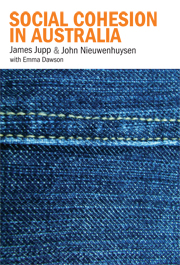Book contents
- Frontmatter
- Contents
- Foreword
- List of contributors
- List of tables
- Acknowledgments
- Introduction
- PART I DEFINING, MEASURING AND SEEKING SOCIAL COHESION
- PART II THE DYNAMICS OF SOCIAL COHESION
- 5 The landmark of Cronulla
- 6 Policing the other: Lebanese young people in a climate of conflict
- 7 Religious resurgence and diversity and social cohesion in Australia
- 8 Family and nation: the Indigenous/non-Indigenous relationship
- 9 Social cohesion and cultural fragility: a paradox of Indigenous rapports with Eurasian Australia
- 10 Educational attainments, inter-ethnic marriage and social cohesion
- PART III INFLUENCES AND RESPONSES IN SEARCHING FOR SOCIAL COHESION
- References
- Index
6 - Policing the other: Lebanese young people in a climate of conflict
Published online by Cambridge University Press: 22 September 2009
- Frontmatter
- Contents
- Foreword
- List of contributors
- List of tables
- Acknowledgments
- Introduction
- PART I DEFINING, MEASURING AND SEEKING SOCIAL COHESION
- PART II THE DYNAMICS OF SOCIAL COHESION
- 5 The landmark of Cronulla
- 6 Policing the other: Lebanese young people in a climate of conflict
- 7 Religious resurgence and diversity and social cohesion in Australia
- 8 Family and nation: the Indigenous/non-Indigenous relationship
- 9 Social cohesion and cultural fragility: a paradox of Indigenous rapports with Eurasian Australia
- 10 Educational attainments, inter-ethnic marriage and social cohesion
- PART III INFLUENCES AND RESPONSES IN SEARCHING FOR SOCIAL COHESION
- References
- Index
Summary
The intention of this chapter is to discuss the issue of policing and social cohesion by examining the relationship between Lebanese-Australian youth in western Sydney and the New South Wales police. Nationally, there is no doubt that relations between the police and ethnic minority youth continue to be fraught with difficulties, tensions and problems, as well as important positive policing developments (see White 2006). But the major flashpoint for conflict today is Sydney. Why this is so and what can be done to remedy the situation is the focus of this chapter.
Discussion of policing, ethnicity and youth has to acknowledge the historical background to specific conflict situations, the triggers to these, and the legacy of inappropriate policing strategies in fomenting ongoing conflicts into the future. From a policing point of view, the challenge is to weigh up and evaluate both tactical issues relating to appropriate forms of intervention and the use of force in particular situations, and longer-term strategic issues relating to the maintenance and enhancement of general community relationships. Froma community viewpoint, the questions are: are the police with us, or against us? At the heart of this is a concern to find ways to improve police–community relationships in a practical and workable manner. Such relationships have been damaged by the criminal actions of a few people within certain communities and the resultant negative media publicity. They have also suffered at the hands of consistently bad policing policy and practice over a fairly long time.
- Type
- Chapter
- Information
- Social Cohesion in Australia , pp. 70 - 79Publisher: Cambridge University PressPrint publication year: 2007
- 2
- Cited by



